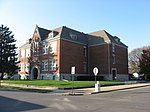Charles Franklin Sparrell
Charles Franklin Sparrell | |
|---|---|
 | |
| Born | February 26, 1852 |
| Died | February 24, 1934 (aged 81) |
| Nationality | American |
| Occupation | Architect |
| Buildings | Columbus City Hall McKinley School |
Charles Franklin Sparrell was born in Boston, Massachusetts in 1852 and died in Newport, Kentucky in 1934.[1] He was the most influential architect in the city of Columbus, Indiana in the late 19th century. When he arrived in the city in the early 1880s he was credited as having attended an "institute of technology" in Massachusetts, but Massachusetts Institute of Technology does not list him as an alumnus.[2] More than 10 of his buildings remain in the city, many of which are on the National Register of Historic Places listings in Bartholomew County, Indiana.
Architectural career
Before starting his own practice, he worked for Hege and Company Contracting as a shop foreman. His own offices were located on 330, 332, and 334 Fifth Street and his employees included Georgia Wills, a woman who worked for him as an assistant draftsman.[2]
Among his most notable buildings are the Columbus City Hall and the Maple Grove School.
Columbus City Hall was completed in 1895 and remains at 445 Fifth Street.[3] Today it is operated as an apartment complex.[4] This brick romanesque revival building features a tall, square bell tower and limestone detailing. When first opened it contained the police station and the jail. It also had a banquet hall, a dance hall, a basketball court, and an exhibit area. A farmers market operated out of the basement that opened to the public on the west side of the street.[5]
While the Maple Grove School has been home to a variety of organizations and was quickly renamed the Garfield Elementary School, it was built in 1896 as a four classroom school house. In the late 1980s Arvin Industries renovated and expanded the building to serve as the company's headquarters.[3] Today it serves as the administrative building for the Bartholomew Consolidated School Corporation.[6]
List of buildings designed by Sparrell
It is not clear if the former A. J. Banker's Hospital or Reeves Pulley Company were designed by Sparrell; only one published source indicates he designed these buildings.[2]
References
- ^ The Columbus Indiana Architectural Archives. "The Legacy of Charles Franklin Sparrell". Retrieved 17 August 2013.
- ^ a b c Bartholomew County Historical Society, ed. (2003). History of Bartholomew County Indiana, 20th century. Columbus, Indiana: Bartholomew County Historical Society. pp. 322–323.
- ^ a b Rand, Paul (1998). A Look at Architecture (7th ed.). Columbus, Indiana: Visitors Center, Columbus, Indiana. pp. 20–21. Cite error: The named reference "Rand" was defined multiple times with different content (see the help page).
- ^ "Historic City Hall Loft Living Apartments". Historic City Hall Loft Living Apartments. Retrieved 17 August 2013.
- ^ Mote, Patricia M. (2005). Columbus. Charleston, SC: Arcadia. pp. 80–81. ISBN 978-0-7385-3363-6.
- ^ "Bartholomew Consolidated School Corporation". Bartholomew Consolidated School Corporation. Retrieved 17 August 2013.




